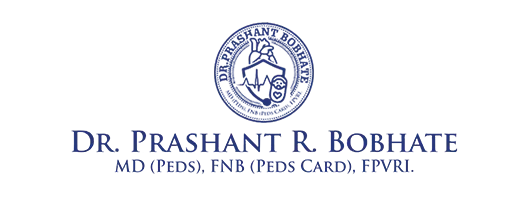
2D Echocardiography for Children in Mumbai, India
2D Echocardiography is a safe, non-invasive cardiac test that provides real-time images of the heart’s structure and function. It is crucial in diagnosing congenital heart abnormalities, valve disease, and cardiomyopathies in newborns, infants, and developing children.
“A well-performed pediatric 2D echo can change the course of a child’s treatment journey,” shares Dr. Prashant Bobhate, an acclaimed pediatric cardiologist in Mumbai. “It allows us to diagnose and act early, often without the need for invasive procedures.”

With over a decade of experience in pediatric heart care, including fetal, neonatal, and interventional cardiology, he offers detailed and child-friendly cardiac assessments at the Children’s Heart Centre, Kokilaben Dhirubhai Ambani Hospital. He specializes in 2D Echocardiography for Children in Mumbai, India, ensuring correct diagnosis with minimal stress and maximum care.
As Dr. Prashant Bobhate, a leading Pediatric Cardiologist in Mumbai, India, explains:
“Heart conditions in children are not always visible at birth, but early detection can be life-saving. A child’s heart health influences everything—from growth and development to learning and energy levels. Timely diagnosis and treatment ensure a healthier, more active childhood.”
Contact Us
What conditions can a simple echo detect in children? Here are the most common pediatric heart problems identified with a 2D echo.
Pediatric Conditions Diagnosed with 2D Echocardiography
Congenital Heart Defects (CHD)
Conditions like atrial septal defect (ASD), ventricular septal defect (VSD), and patent ductus arteriosus (PDA) are commonly detected through 2D echo. Early diagnosis allows for timely medical or interventional planning.
Valve Disorders
2D echocardiography assesses whether heart valves are narrowed (stenosis) or leaky (regurgitation), helping to determine the severity and next steps in treatment.
Cardiomyopathy
This scan can reveal abnormal heart muscle thickness, poor contraction, or enlargement—signs of underlying cardiomyopathies that affect heart function.
Heart Murmurs
If your child has an abnormal heart sound, a 2D echo helps confirm whether it’s harmless or linked to a structural problem.
Pericardial Effusion
2D echo can detect fluid buildup around the heart, which may be caused by infections or inflammatory conditions.
Pulmonary Hypertension
Estimates pressure in the lung arteries and evaluates right heart strain, essential for diagnosing early signs of pulmonary hypertension.
Post-Operative Follow-Up
After surgery or catheter-based procedures, 2D echo is used to monitor healing, heart function, and treatment success over time.
Anxious about what your child will experience during the scan? Here’s a step-by-step walkthrough of how this safe, painless test is done.
How Dr. Prashant Bobhate Performs 2D Echo for Children
Step 1: Initial Consultation & History Check
Before the test, Dr. Bobhate reviews the child’s symptoms, past reports, and reasons for the echo. This helps guide a focused, meaningful evaluation.

Step 3: Gel Application & Probe Placement
A clear, water-based gel is applied to the chest to help transmit ultrasound waves. A small handheld probe (transducer) is gently moved over the heart area.
Cost of 2D Echocardiography for Children in Mumbai
The price of 2D echocardiography for children in Mumbai can vary depending on the location of the test, the technology used (such as Doppler or color flow imaging), and whether it includes immediate expert interpretation. In most hospitals and diagnostic centers, this non-invasive cardiac ultrasound is considered a cost-effective first-line investigation for suspected heart conditions.
At top hospitals such as Kokilaben Dhirubhai Ambani Hospital, the test is conducted by a pediatric heart specialist in Mumbai on high-tech imaging machines. Charges typically cover the scan, interpretation by a child cardiologist, and a follow-up consultation to discuss the findings and propose a course of action. Most families are also aided by insurance billing, as well as package deals specifically designed for children’s heart care.

Why Trust Dr. Prashant Bobhate for Pediatric 2D Echocardiography?
12+ Years of Focused Pediatric Cardiology Experience
Dr. Bobhate brings a decade of hands-on expertise in conducting and interpreting pediatric 2D echo scans with precision.

International Training in Cardiac Imaging
He has received training at leading Indian and Canadian institutes to ensure that the newest techniques are employed in examining young hearts.
Specialization in Complex Heart Conditions
He frequently identifies subtle signs of CHD, pulmonary hypertension, or cardiomyopathies early, when treatment matters most.
Frequently Asked Questions
1. What is pediatric 2D echo?
It’s a harmless cardiac ultrasound that provides live images of a child’s heart structure and function.
2. Is a 2D echo safe for children?
Yes, it employs sound waves—not radiation—and is entirely safe, even for newborns and babies.
3. Does 2D echo need sedation?
Generally not. Sedation can be used in very young or nervous children.
4. Can a 2D echo diagnose all heart abnormalities?
It will recognize most structural heart abnormalities but might need to be used in conjunction with other tests for close examination.
5. Is 2D echo the same as ECG?
Yes. ECG monitors electrical activity, whereas a 2D echo monitors structure and flow of blood.
6. Does every child with a murmur require an echo?
Not always, but many do. The pediatric cardiologist makes a decision based on clinical signs and symptoms.
7. What is color Doppler in 2D echo?
It shows the direction and speed of blood flow using color-coded imaging.






